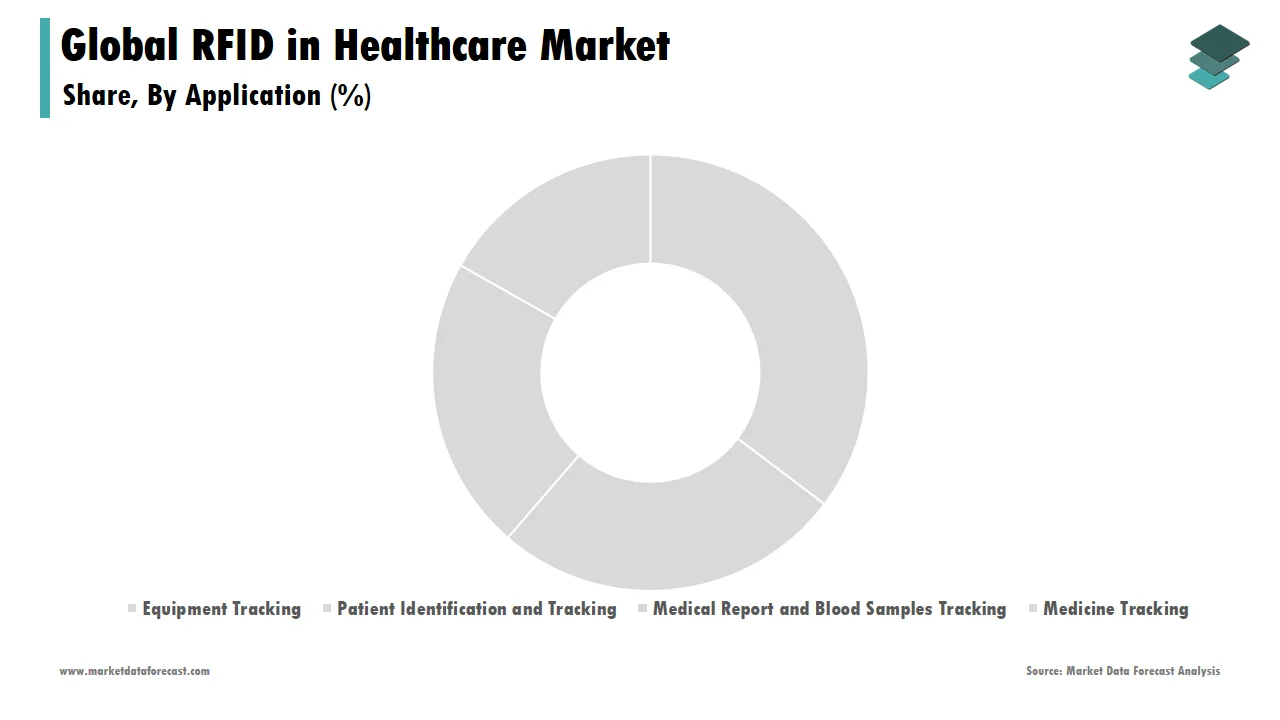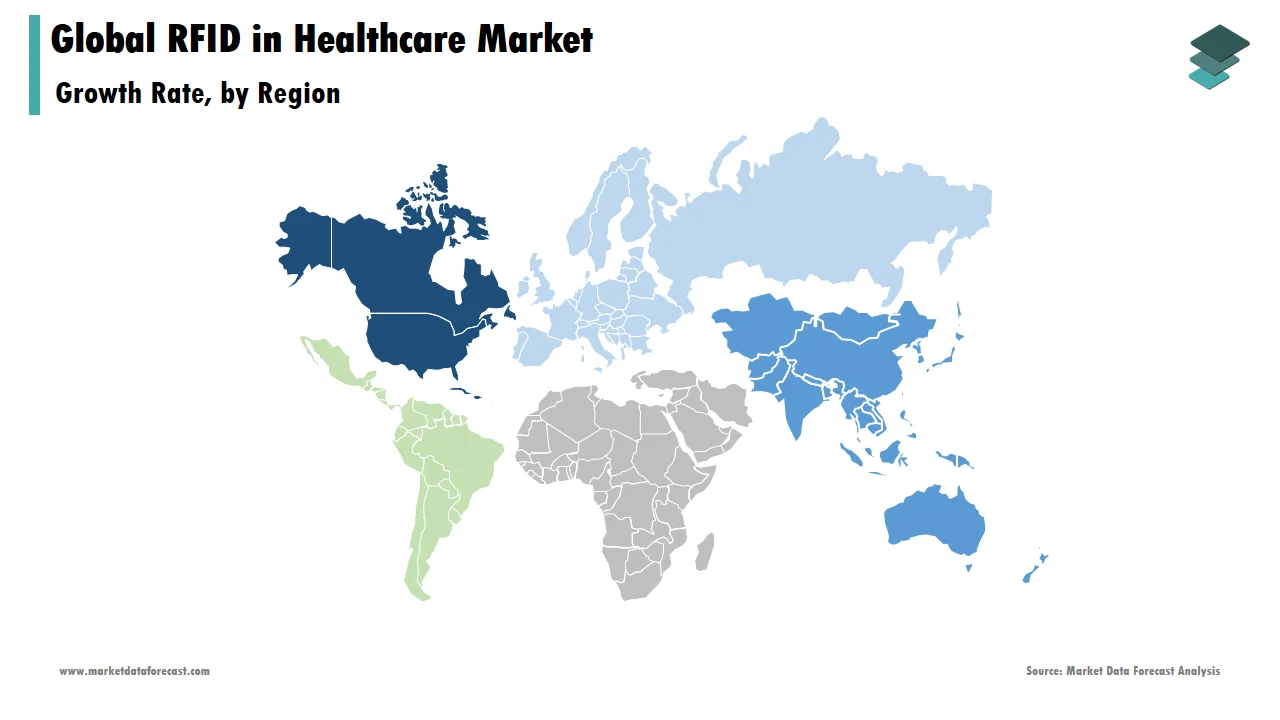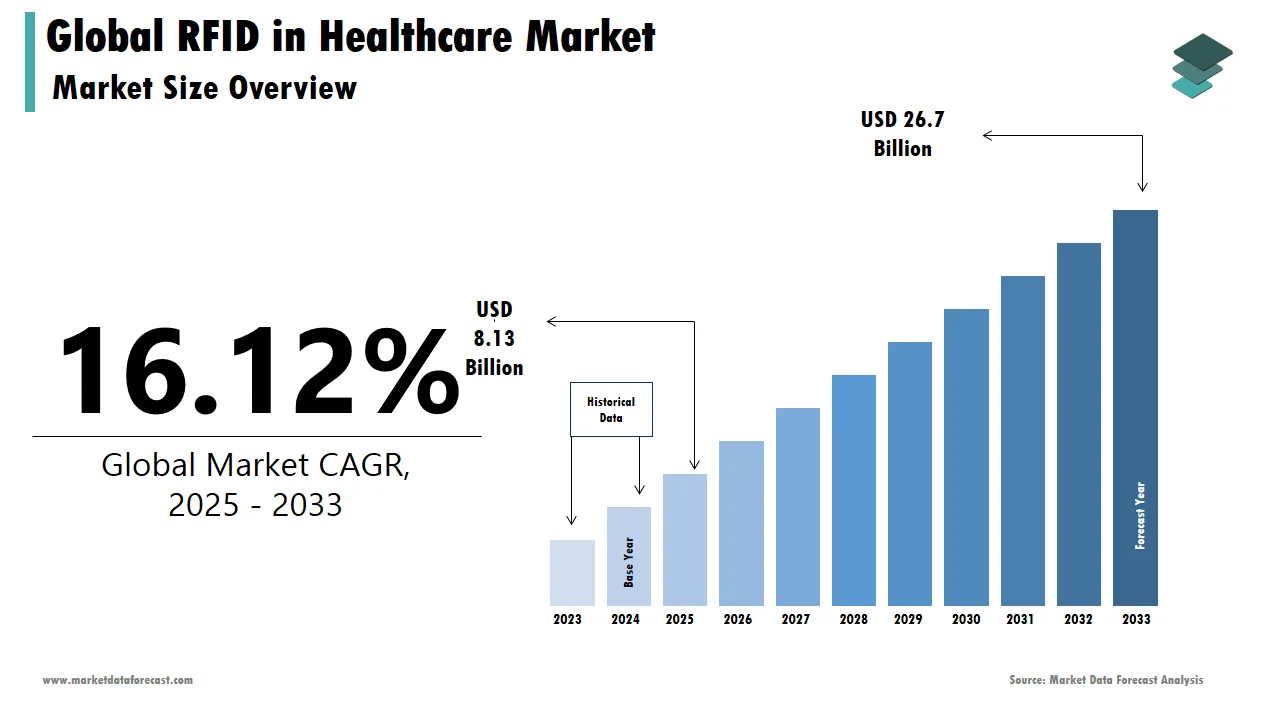Global RFID in Healthcare Market Size, Share, Trends & Growth Forecast Report By Product, Application, End-User and Region (North America, Europe, Asia-Pacific, Latin America, Middle East and Africa) Industry Analysis From 2025 to 2033.
Global RFID in Healthcare Market Size
The global RFID in healthcare Market was valued at USD 7 billion in 2024. The global market is projected to grow from USD 8.13 billion in 2025 to reach USD 26.7 billion by 2033, exhibiting a compound annual growth rate (CAGR) of 16.12% from 2025-2033.
MARKET DRIVERS
RFID technology has been used effectively in healthcare facilities management and is majorly propelling the growth of RFID in the healthcare market.
RFID in healthcare is used for improved management of inventory, avoidance of shortages, overstocking, and counterfeiting, significantly influencing the operating costs of multiple healthcare institutions on a global scale. It is expected to further boost the demand for RFID in healthcare over the forecast period. Auto-ID technologies use barcoding to improve supply chains and other processes. Barcode labels are typically read-only, but RFID tags contain unique features, including the ability to read and write, making them flexible. In addition, the Food and Drug Administration (FDA) of the United States assesses the use of RFID tags for product degree verification. Medication shortages in pharmacies are expected to grow the global RFID in the healthcare market. Around 62% of pharmacy staff reported dealing with up to 20 medication shortages at a time in August 2020, according to the kit check annual survey.
Demand for cost-efficient drugs among the population, rise in demand for RFID in pharmacies, and installation of RFID solutions across healthcare is likely to provide lucrative growth opportunities for the market growth. In addition, the increase in regulations and government initiatives, rising applications for tracking these devices in hospitals, the rising demand for testing samples of blood and urine, and rise in the research and development activities in the healthcare sector, and an increase in the demand from emerging economies are all the factors drive the market in coming years. Radiofrequency identification (RFID) is increasingly needed in the healthcare market for patient care, asset management, patient tracking, and pharmaceutical counterfeiting, as well as for tracking devices, supplies, and other products like blood and samples. Using highly advanced technology and integrated technologies in healthcare has increased the popularity of RFID systems. During the forecast period, it is projected that using RFID tags for Industry 4.0, the Internet of Things, and smart manufacturing solutions will provide lucrative opportunities for the market's growth.
MARKET RESTRAINTS
On the other hand, growing generic availability, fierce rivalry, the increased popularity of sustainable chemistry, high-cost maintenance of RFID systems, and concerns regarding data security and privacy restrict the growth of RFID in the healthcare market. Furthermore, lack of awareness of client orders, rising availability of many generics and intense competition, the growing popularity of sustainable chemistry, lack of skilled professionals, and available stock will result in greater inventory, and unnecessary financial locks are further anticipated to hinder the growth rate of the market.
REPORT COVERAGE
|
REPORT METRIC |
DETAILS |
|
Market Size Available |
2024 to 2033 |
|
Base Year |
2024 |
|
Forecast Period |
2025 to 2033 |
|
CAGR |
16.12% |
|
Segments Covered |
By Product, Application, End-User, and Region. |
|
Various Analyses Covered |
Global, Regional, and country-level analysis; Segment-Level Analysis, DROC; PESTLE Analysis; Porter’s Five Forces Analysis, Competitive Landscape; Analyst Overview of Investment Opportunities |
|
Regions Covered |
North America, Europe, APAC, Latin America, Middle East & Africa |
|
Market Leaders Profiled |
Alien Technology, Mobile Aspects, Inc., RF Technologies, Inc., Radiance, STID, STANLEY Healthcare, LLC, GAO Group Inc., Honeywell International Inc., Motorola Solutions, Inc., CAEN RFID S.r.l., NewAge Industries, Inc., IBM Corporation, Siemens, AMERICAN RFID SOLUTIONS, LLC, 3M., and Others. |
SEGMENTAL ANALYSIS
By Application Insights

Based on the application, the patient identification and tracking segment was the most profitable segment in 2022 among all. Patient tracking plays a significant role in scheduling appointments for operating rooms and diagnostic rooms in big and medium-sized hospitals. As a result, the segment is anticipated to see the fastest CAGR due to the advantages of tracking each patient's progress around the hospital's various departments utilizing this technology.
By End-User Insights
The pharmaceutical and biotechnology companies segment had the largest share of the global RFID in healthcare market in 2022. RFID is used to identify and track counterfeit products, automate dispensing, and track prescriptions for clinical studies. Pharmaceutical tracking systems are helpful to patients, organizations, and supply chain partners. There has been an increase in the propagation and distribution of forged drugs that stance an augmented risk for health hazards.North America
REGIONAL ANALYSIS

Geographically, the North American region was the most dominant region among all the regions in the global market in 2022, owing to the growing usage of automated processes in hospitals and pharmacies, more stringent laws for patient safety and its advanced healthcare infrastructure, advantages of integrating RFID, more stringent patient safety regulations, and medical device tracking mandates. The U.S. is considered a home to the retail industry, consumer products brands, and global housing apparel. In addition, the U.S. is expected to boost the North American market due to the growing adoption of RFID tags in the aviation sector. These tags are used in aviation to control luggage, logistics, and other transportation equipment to facilitate timely delivery and avoid misuse.
The Asia-Pacific market is predicted to have the fastest growth rate during the forecast period. The expanding healthcare systems in China, Japan, and India are credited with this rapid expansion. Factors such as growing concerns about expensive medical device tracking, patient safety, demand for effective supply chain management, and hospital upgrades are likely to accelerate market growth in this region. China has dominated the APAC regional market growth. RFID tag applications in the automotive industry can improve dealership and vehicle identification. A much-desired solution in the automotive sector can obtain vehicles' real-time status and location. Europe is expected to have lucrative opportunities in the coming years, and the U.K. is dominant among them. Factors such as increasing adoption of RFID tags in vehicles, increased tourism, and improved security and packages influence market growth.
KEY MARKET PLAYERS
The major players operating in the global radio-frequency identification technology (RFID) in the healthcare market are Alien Technology, Mobile Aspects, Inc., RF Technologies, Inc., Radiance, STID, STANLEY Healthcare, LLC, GAO Group Inc., Honeywell International Inc., Motorola Solutions, Inc., CAEN RFID S.r.l., NewAge Industries, Inc., IBM Corporation, Siemens, AMERICAN RFID SOLUTIONS, LLC, and 3M.
RECENT MARKET DEVELOPMENTS
In 2021, Nebula joined with CAEN RFID to innovate RFID T&T solutions. 2. Crystal approves Zebra Technologies' RFID solutions to improve the omnichannel experience in 2021.
MARKET SEGMENTATION
This research report on the global RFID in healthcare market has been segmented and sub-segmented based on product, application end-user, and region.
By Product
- Systems & Software
- Tags
By Application
- Equipment Tracking
- Patient Identification and Tracking
- Medical Report and Blood Samples Tracking
- Medicine Tracking
By End-User
- Pharmaceutical and Biotechnology Companies
- Hospitals
- Research Institutes
By Region
- Europe
- Asia-Pacific
- Middle East Africa
- Latin America
Frequently Asked Questions
How much was the value of the RFID in healthcare market worldwide in 2024?
The global RFID in healthcare market size was worth USD 7 billion in 2024.
Which segment by application is dominating the RFID in healthcare market?
Based on the application, the patient identification and tracking segment accounted for the largest share of the market in 2024.
How much was RFID in healthcare market valued in Europe in 2024?
The European RFID in the healthcare market was worth USD 7 billion in 2024.
What is the growth rate of the RFID in healthcare market in North America?
The North American RFID in the healthcare market is predicted to grow at a CAGR of 15.49% from 2025 to 2033.
Related Reports
Access the study in MULTIPLE FORMATS
Purchase options starting from $ 2500
Didn’t find what you’re looking for?
TALK TO OUR ANALYST TEAM
Need something within your budget?
NO WORRIES! WE GOT YOU COVERED!
Call us on: +1 888 702 9696 (U.S Toll Free)
Write to us: [email protected]

